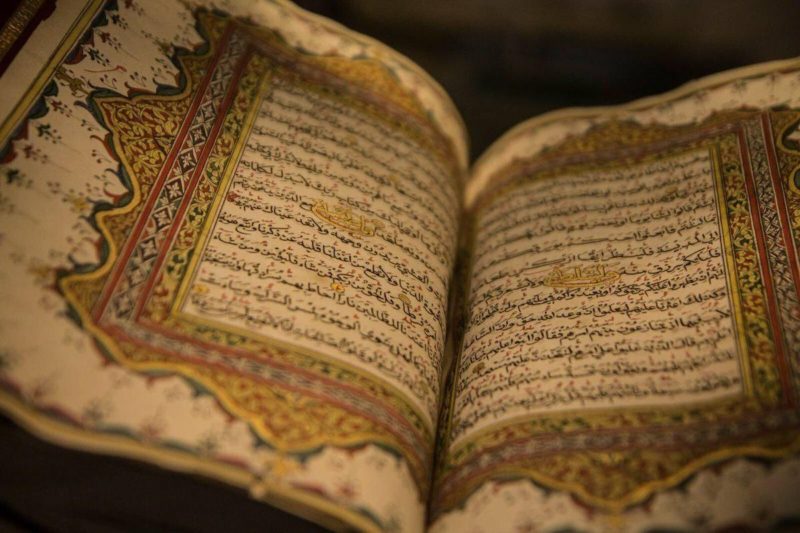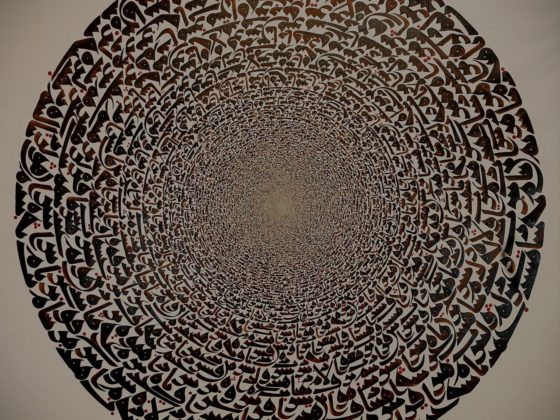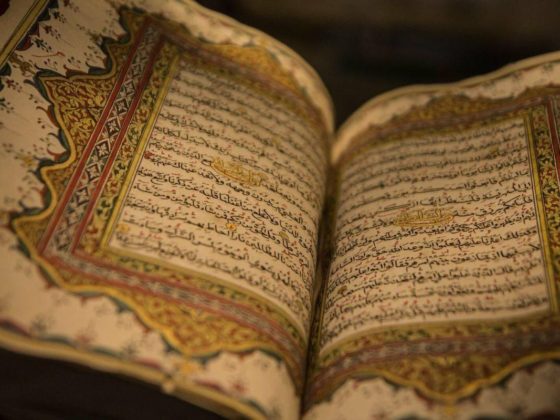As we have already said, bismillahi rrahmani rrahim ( In the name of Allah, the Most Gracious, the Most Merciful ) is an ayah. Moreover, it is the best ayah of the Book of Allah.
So, the first verse of Surah Fatiha and the first verse of the Quran in general are bismillahi rrahmani rrahim .
Bismillahi is the recourse to the three names of the Creator and His greatest name. These words contain everything that is in the Ummu l-Kitab , and the Ummu l-Kitab contains everything that is in the Quran.
Therefore, as the hadith says, any deed that does not begin with bismillah rrahmani rrahim – “abtar”, that is, short , circumcised, castrated. Why? Because every deed is from Allah, and at the beginning of every deed from Allah there must be the mercy of Allah, which is hidden in the bismillah . And therefore everything that exists began with the bismillah . The written book corresponds to the Book of Genesis, the Quran corresponds to the entire universe. If the Quran begins with the bismillah rrahmani rrahim , then the whole universe begins with bismillah rrahmani rrahim . As the hadith says: “ It was manifested existence through bismillah rrahmani rrahim .”
In “Maani l-akhbar” by Shaykh Saduq it is narrated from Ali ibn Hasan ibn Ali ibn Fazzal from his father that he said:
I asked Imam Reza (A) about the meaning of the words “in the name of Allah” (bismi (Allah ). He said: “The words of the one who says “in the name of Allah” mean: “I place on myself the seal of the sign of Allah, great and holy is He, and this is worship (ibadat )”.
I asked, “What is a ‘sign (simat )’?” He said, “An attribute (‘ alamat ) ».
(Maani l-Akhbar, V. 3).
That is, when a person says bismillahi rrahmani rrahim before starting any business, on this business the seal of Allah is put, as it were. The seal that this business is pleasing to Allah.
It is mustahabb (advisable) to say bismillah at the beginning of every deed. When you sit down, say bismillah , when you stand up, say bismillah … But even just saying bismillah is mustahabb . When I am not doing anything, but I say bismillah rrahmani rrahim .
Every action should commence with the name of Allah, as any endeavor without His name is hollow and futile.
Moreover, the mere utterance of “Bismillah” at the outset of each task serves to ward off sins and wrongdoing. Typically, when one embarks on a sinful path, they do not invoke “Bismillah.” Whether it’s contemplating forbidden things, engaging in ghaibat (saying behind one’s back), deceiving someone, or listening to music and singing, the phrase is conspicuously absent. To say “Bismillah” before committing a sin would be odd; it’s a clear indication of wrongdoing. Imagine someone turning on haram music and saying “Bismillah”; it’s absurd. However, without the usual invocation of “Bismillah,” the person subconsciously acknowledges and confirms the sinfulness of their action.
You see here the wisdom of Islam and the wisdom of the words of the Messenger of Allah (S)… By not saying bismillah , he mentally sent himself a signal that this deed was wrong. And therefore, it should be abandoned. That is, bismillah is like a signal or an instruction that cuts through the flow of our life. After all, we live in a flow. We do our deeds every day, often without thinking about what we are doing. The flow of life carries us away. But then a caesura, a pause, breaks into this flow, which occurs during the pronunciation of bismillah before each of the deeds. By pronouncing bismillah , we seem to put our life on a momentary pause. And during this pause, the Divine will flows into the flow of our life and asks the question: is what you are doing now right? Thus, bismillah makes our life meaningful, filled with divine meaning.
Shaykh Tusi reported that Imam Sadiq (A) said: ” The words “Bismillahi rrahmani rrahim” are closer to the greatest name of Allah than a pupil is to the eye” .
(“ Tahzib ”, volume 2, p. 289).
The same hadith was reported by Shaikh Saduq from Imam Reza (A) in “Uyun Akhbar ar-Reza.”
What does this mean? The pupil of the eye is as close as possible to its white, and is one with it. That is, bismillah is the greatest name of Allah ( ism a’azam ). The pronunciation of this formula ( bismillah rrahmani rrahim ) is the pupil in this example, and the meaning of the greatest name (its reality, Ahl ul -Bayt) – protein.
That is, let us say it this way: the greatest name is expressed through bismillah rrahmani rrahim . The Greatest Name is not some set of letters, as some may think. Although there are hadiths about its letters, but these are not the letters that are pronounced by our language. The Greatest Name is reality. It is the same as the greatest sign of Allah, or His first creation, or the first reality, or the first light , that is, Ahl ul -Bayt (A).
And since the creation began with the greatest name, it is necessary that the written Book also begin with the greatest name, since the written Book corresponds to the Book of Genesis.
All things are names; all creation is a Book. There is a book of being, and there is a book written (the Quran), and the latter corresponds to the former. There is a bismillah written, and there is a bismillah of being, and Ali (A) is the dot under the ba in this bismillah (as he himself says). There are “nineteen above Hell”, and there are nineteen letters in ” bismillah ” (because in the Arabic phrase bismillah rrahmani rrahim nineteen letters), and this is the numerical value of ” wahid “, that is, “one”, and this is Wilayat . There is the “Fatiha” of the written Book, and there is the “Fatiha” of existence, and this is sab’u mina al- masani (“the seven recurring ones”), and these are the Fourteen Immaculate: “We have given you the seven recurring ones and the great Qur’an ” (15:87).
And therefore bismillah rrahmani rrahim is the reality of Wali Allah. And that is why the hadith says that bismillah is closer to the greatest name than the pupil of the eye is to its white, and the greatest name is Wali.
Let us now examine this phrase in order. So, we say “in the NAME of Allah, the Merciful, the Compassionate.” Thus, we confirm that everything that exists appeared through the name of Allah. All things are names or words uttered by the Mashiyya (Will) of the Creator.
Imam Ali (A) says: “ The name – this is what indicates the named ”, and in the language of the universe the named is not who else but the Creator. And therefore all things point to Allah, all creation leads to Him and points to Him, and He revealed Himself to the creations through themselves. same creations, and not by its essence. In this regard, every being — a name that points to the one named, that is, to the Creator.
And that is why in the Quran things or people are called “words”: ” And Adam received words from his Lord ” (2:37); ” Allah gives you good tidings of a word from Him, whose name is the Messiah, Isa son of Maryam ” (3:45); ” Say: “If if the sea were ink for the words of my Lord, it would run dry “the sea would be before the words of my Lord were exhausted ” (18:109), and “words” here are all created things, and “sea” is the sea. being.
In Arabic ism (word, name) comes from vasm or simat , that is, “sign” something. In this regard ism – this is every trace or a sign indicating the one who produced it. And since all things are traces of the action of Allah and the radiance of the light of His Mashiyya and Fayz , then all of them — names that point to Him. And therefore there are two kinds of names — spoken and existential. There is a spoken language and there is a language of existence, for all things are spoken from the Messiah. Creator.
So, everything is names, everything is words, but there are levels of names and words. That’s exactly right. same as all things — the signs of Allah, but there are different levels of these signs. The highest word, the greatest name, or (something the same) the highest sign is the Light of the Creator, Ahl ul -Bayt, the Fourteen Immaculate. That is why the verse says: “ And He taught Adam all the names .” — that is, to everything that exists, to all things. But how He taught him all things? Through this supreme reality of all things. Because immediately the Quran says (after stating that He taught Adam all the names): “ Then He presented them ( araza-hum ) to the angels ” (2:31). Here the animate pronoun “ hum ” is already used. This is a pronoun that refers only to living beings, and not just things. Taught everyone names (inanimate pronoun) – and immediately he also “introduced them” (animate beings) to angels.
That is to say, what here it reaches us the Quran? That the reality of all these names was hidden in some animate beings, whom the Most High presented to the angels, and said: ” Inform Me of their names (animate pronoun) if you are truthful ” (2:31). Again we see an animate pronoun here — hawla . In Arabic it is used only for alive creatures.
Thus all things have names, because they all point to the Creator who produced them, but among them there is a gradation and hierarchy, and at the top of this hierarchy stands the highest Word or the greatest Name of Allah ( ism. aʻazam ), which is Muhammad and House of Muhammad (WITH).
Let us now move on to the name of Allah in the phrase bismillah rrahmani rrahim .
The name “Allah” is also called lafzu l- jalalah – “the name of greatness”. The word “Allah” has as its basis the word “ilah ” meaning “god” and the article ” al ” meaning unity and uniqueness, that is, “the One God”.
And in the hadiths it is stated that “Allah” comes from “ malukh ”, that is, “the one before whom the minds are amazed”.
Allah is the highest name of God, indicating His essence and embracing all His attributes . The Quran says: “ Call upon Allah or call upon the Most Merciful; by whatever name you call, to Him are the best names ” (17:110). So what does this mean? Allah has asma husna – the best or beautiful names. And the one who is described by all these names is Allah Rahman, Allah the Merciful. ” Call upon Allah or call upon the Merciful; whatever you call, His are the best names ” – the one whom you call by the best names is Allah and the Merciful.
Further, the verse says: Rahmani rahim (“… the Most Gracious, the Most Merciful “).
Both of these words come from the same root – rahma . In this case , rahma , “mercy”, does not mean what people usually understand by “mercy”. For us, “mercy” is softness, affection, love. But the mercy of Allah is, first of all, endowment, feyz , bestowal. Allah endows creations and bestows upon them all blessings – in this sense He is “merciful”. Endows every atom, ignites every particle of being, gives existence and everything necessary to things and creatures… Rahman…
The grammatical form of the word ” rahman ” indicates a multitude, an abundance of mercy. For example, gazban is “one who gets angry a lot.” Also, rahman is “one who gives a lot of mercy.” Rahma (mercy) embraces everyone – both believers and unbelievers, both righteous and sinners: all creations – people, animals, plants, down to atoms.
Shaykh Saduq reported from Safwan ibn Yahya : Imam Sadiq (A) was asked about the meaning of the words “in the name of Allah, the Most Gracious, the Most Merciful” ( bismi llahs rrahmani rrahim ).
I asked: “What does ‘Gracious’ (rahman ) mean?”
He said: “Mercy over all the worlds”
I asked: “Merciful? (rahim )”
He said: “Only for the believers ( mu’minun ).”
(Maani akhbar “, p. 3).
The 75th verse of Surah Maryam says: “Say: ‘Whoever is in error, let the Most Merciful extend his limit” – that is, Rahman extends and grants provision even to the astray. And in Surah Al-Maryam, verse 156, we read: “And My mercy encompasses all things” (7: 156). And therefore, it would probably be better to translate the word Rahman into Russian as “All-Merciful”.
The word “Rahman” holds a significant meaning. “Rahim,” which shares the same root, signifies unwavering mercy. In Russian, we translate it as “merciful” due to the absence of a better equivalent. However, strictly speaking, “Rahim” is not merely “merciful.” While “Rahim” implies frequent displays of mercy, “Rahman” suggests an eternal and unchanging state of compassion.
Name Rahim is used to indicate a constantly bestowed, eternal and everlasting blessing that is granted only to the believer. “ And He is rahim (ever merciful) to the believers ” (33:43).
Note another nuance about these two names of Allah. The word “Rahman” has more letters than “Rahim.” “Rahman” signifies mercy in both this world and the hereafter. In contrast, “Rahim” denotes mercy only in the afterlife. Mercy in this world for believers means Allah grants them what they rightfully deserve. Mercy for disbelievers in this world aims to complete good and demonstrate it to them. This is echoed in Surah al-An’am, verse 44: “And when they forgot what they had been reminded of, We opened for them the gates of everything. And while they were rejoicing at what they had been given, We suddenly seized them, and behold, they were in despair .”
So Allah is merciful, rahman , to the disbeliever in this world, but not in the next, because in the next world there is sifat. rahim , and it does not apply to unbelievers, but only to believers.
Mercy in this world acts simultaneously for both believers and unbelievers, but through the lens of adl, or justice. For believers, this means Allah removes or forgives their sins through trials. These challenges, such as loss of property, poverty, illness, or conflicts with others, are not just hardships but opportunities for atonement. In this life, their sins are erased, and they will not be held accountable for them in the afterlife.
Similarly, sifat also affects unbelievers through adl. They too face disasters, illnesses, and hardships, but the purpose is different. These trials are meant to lead them to faith. The idea is that by experiencing the transitory nature of worldly life, they realize its emptiness and turn to the Creator.
Often, people’s disbelief stems from their attachment to this world. For example, someone might understand that Shiism is the truth, but they hesitate to embrace it because of the potential consequences—losing relationships, wealth, or social standing. Many live according to societal programs, unwilling to deviate. However, if they understood the transient nature of this world, they would be more inclined to reject its programs and seek a higher purpose.
The near world is a place of shattered hopes and broken plans, a realm of betrayal and deception. By allowing people to lose their attachment to it, Allah shows mercy. This Rahma is a way to guide both believers and unbelievers toward a better path. For believers, it’s a means of forgiveness and redemption. For unbelievers, it offers a chance to change their ways and find true meaning.
Thus, through these trials, mercy is manifested in this world. For believers, it means the erasure of sins. For unbelievers, it provides an opportunity for transformation and spiritual growth.
There is a question:
If Allah is rahman (all-merciful), then why will He send some of His creations to Hell forever? If His mercy encompasses everything, then how come some of His creations will be deprived of His mercy?
The answer is:
His mercy encompasses every thing, but if the thing itself has turned that mercy into disfavor, then disfavor will be what encompasses it. And when disfavor has encompassed it, then it is the result of its own actions and its own choices.
Consider the sun as an illustration of Allah’s mercy. The sun’s rays shine equally upon all, never withholding its light. Yet, the way different objects perceive this light varies. For instance, a clean mirror reflects the sun’s brilliance, while a black mirror transforms it into darkness, its opposite. This is the nature of the sun’s light—consistent and uniform. However, the characteristics of the mirror determine whether the light is reflected or absorbed.
Similarly, Allah’s mercy is constant and impartial towards all creation. But the actions and thoughts of individuals can distort this mercy, turning it into anger.


